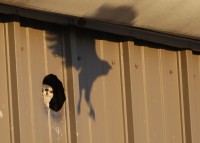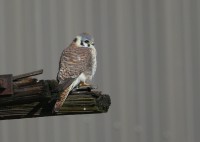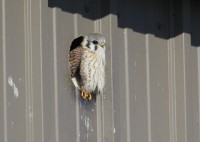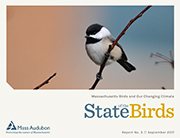Kestrel mobbed by Crows
April 20, 2012 in Nearby Landbirds
 This female American Kestrel has been mobbed by Crows numerous times earlier in the week. The mobbing has taken place with one or both Kestrels in or near the cavity opening to the nest. They seem to tolerate the mobbing but only up to a certain point. One of the Kestresl seems to get fed up and then the big chase is on as the Kestrel will then chase the mobbing crow away from the nest area. The mobbing gets fairly close at times. Fascinating to watch the interplay!
This female American Kestrel has been mobbed by Crows numerous times earlier in the week. The mobbing has taken place with one or both Kestrels in or near the cavity opening to the nest. They seem to tolerate the mobbing but only up to a certain point. One of the Kestresl seems to get fed up and then the big chase is on as the Kestrel will then chase the mobbing crow away from the nest area. The mobbing gets fairly close at times. Fascinating to watch the interplay!
More photos posted on line: http://www.pbase.com/birdshots/image/142785366 Click “next” in upper right to advance frames.


